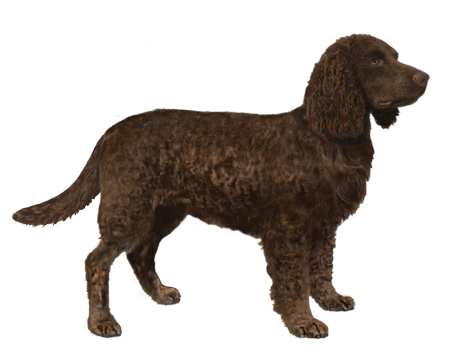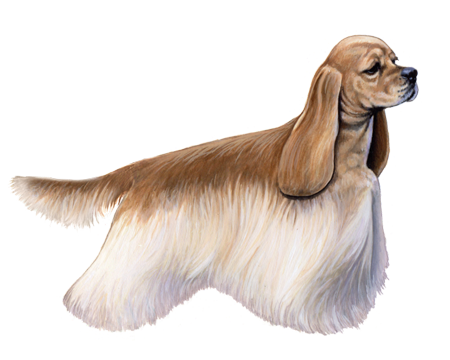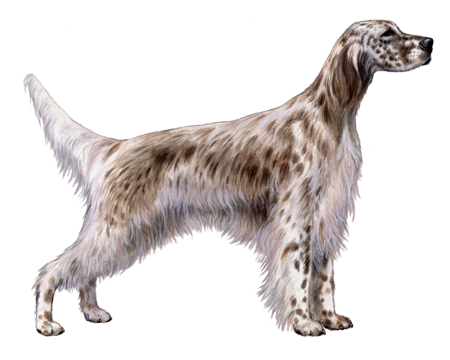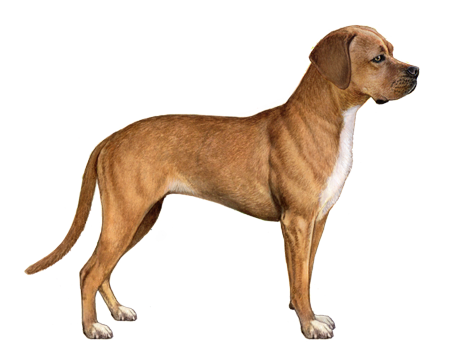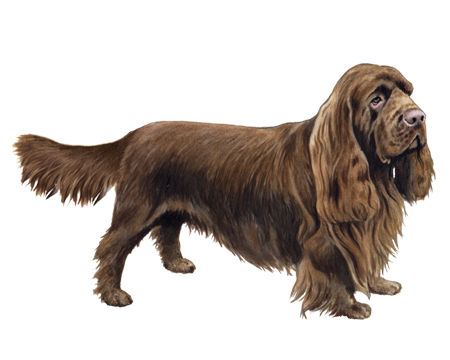
Cavalier King Charles Spaniel
Cavalier King Charles Spaniels are very affectionate and attentive. Though lively and playful companions, they're also happy to curl up on the couch with their favorite human.
Interested in discovering if your dog is a Cavalier King Charles Spaniel?
Check out Wisdom Panel's DNA tests.

Cavalier King Charles Spaniel Traits
General Appearance
The Cavalier King Charles Spaniel is graceful and well-balanced. It has a sweet, gentle expression and a regal, elegant appearance.
Coat and Colouring
The coat of the Cavalier King Charles Spaniel is a moderate length. It has a silky texture. And though it's free from curl, there can be a slight wave. There is feathering on the ears, chest, legs, and feet.
The breed's coat comes in Blenheim (rich chestnut markings on pearly white), black and tan, tricolor (black, tan, and white), and ruby (majority chestnut).
Distinctive Physical Traits
The Cavalier King Charles Spaniel's eyes are large and round (but not overly prominent). They are a warm, dark color and have a cushioning underneath that creates a soft expression.
The breed's ears sit high on the head and are very long, with ample feathering. When a Cavalier King Charles Spaniel is alert, the dog's ears fan forward to frame the face. The Cavalier King Charles Spaniel's tail sits high and wags happily when the dog is in motion.
Cavalier King Charles Spaniel Temperament
Cavalier King Charles Spaniels have a calm, playful nature and are usually sociable. This temperament makes them well-suited to serve as therapy dogs.
Cavalier King Charles Spaniels are typically friendly towards pets and other dogs. And they have a reputation as good family dogs. But it's best to supervise interactions between any dog and young children. This will help prevent accidental injury to the child or dog and ensure the dog doesn't develop fear-based defensive aggression.
The Cavalier King Charles Spaniel is a courageous breed that likes attention and frequent exercise. These dogs love to run, chase, and enjoy outdoor activities. Though Cavalier King Charles Spaniels are small, they are very intelligent and excel in dog sports—such as agility, tracking, and competitive obedience.
Cavalier King Charles Spaniels are usually very food-motivated. This facilitates learning, training, and bonding between the dogs and their family members.


Cavalier King Charles Spaniel History
The Cavalier King Charles Spaniel dates back to the 16th century. The breed is a direct descendant of the King Charles Spaniel and the English toy spaniels of that same period.
Developed as a lap dog for ladies, Cavalier King Charles Spaniels offered both companionship and warmth. In fact, they were sometimes used as foot warmers or in place of hot water bottles. And because disease-carrying fleas were more likely to bite dogs than people, these little lap dogs also protected their owners from the plague.
Legend has it that King Charles II loved his spaniels so much that he made it legal for the dogs to walk within the House of Parliament—something that had previously been unthinkable.
In the 1920s, a man named Roswell Eldridge went to a dog show and offered prize money to anyone who would show a King Charles Spaniel with a long nose. As the breed developed and the long nose became increasingly common, King Charles Spaniels featuring the longer face were classified as Cavalier King Charles Spaniels. This differentiated them from the King Charles Spaniels with the shorter snout.
The breed came to the United States in 1952 and received AKC recognition in 1996.
Cavalier King Charles Spaniel Care
Nutrition
Cavalier King Charles Spaniels need high-quality food appropriate for their current life stage (e.g., puppy, adult, or senior). A diet made for a small breed dog or one formulated specifically for Cavalier King Charles Spaniels is a great option.
This breed can be prone to obesity. To keep your pup's weight in a healthy range, monitor their food intake closely. And don't forget to count calories from treats. Just a couple of extra treats can add up to a lot of excess calories for a small breed dog. As a guideline, treats should make up no more than 10% of your dog's calories each day.
Grooming
The Cavalier King Charles Spaniel's silky, beautiful coat may appear high-maintenance. But weekly brushing is typically all it takes to keep it healthy and clean. If mats start to form, more frequent brushing is necessary.
The breed's long, drop ears are prone to ear infections. So, check ears regularly for signs of infection. Also, be sure to trim nails frequently to maintain an appropriate length. Nails that get too long can lead to pain or issues with walking or running. The hair between your dog's foot pads should also be trimmed regularly.
Small dogs like the Cavalier King Charles Spaniel are particularly susceptible to dental issues due to their little mouths and crowded teeth. So, regular dental care is essential for their overall long-term health. Because of their increased risk of dental disease, this breed may require more frequent professional cleanings beginning at an earlier age.
Exercise
Despite being bred as lap dogs, Cavalier King Charles Spaniels still need moderate daily exercise. This will not only help prevent them from gaining weight but also keep them mentally stimulated. Activities they enjoy include long walks, backyard games, and even trips to the dog park—provided they are kept separate from larger dogs.
This breed also enjoys dog sports such as agility, tracking, and obedience.
Training
Cavalier King Charles Spaniels are good-natured, obedient dogs that are relatively easy to train. Because they're often food-motivated, they respond well to reward-based training.
As all dogs do, Cavalier King Charles Spaniels need early socialization to develop into well-mannered adults.

Cavalier King Charles Spaniel Genetic Health Conditions
-
Chondrodystrophy (CDDY) and Intervertebral Disc Disease (IVDD) Risk
Chondrodystrophy (CDDY) is a skeletal disorder characterized by shortened limbs and abnormal early degeneration of the spinal discs, or intervertebral disc disease (IVDD), which predisposes to disc herniation.
-
Muscular Dystrophy (Discovered in the Cavalier King Charles Spaniel)
Muscular Dystrophy is a severe disorder that causes muscle breakdown and weakness. DMD is characterized by a curve to the dog's back and a crouched posture. It typically affects males, although some females may also show some muscle weakness as well.
-
Xanthinuria (Discovered in the Cavalier King Charles Spaniel)
Xanthinuria can cause formation of stones throughout the upper and lower urinary tracts, including the urethra, bladder, ureters, and kidneys. These stones can result in pain, bloody urine, infection and blockage of the urinary tract.
Knowing if your Cavalier King Charles Spaniel is a carrier or at-risk for these conditions can help you and your veterinarian plan for your pup's lifelong care. With Wisdom Panel™ Premium, you can get results for over 200 genetic health tests.
Breed Group
Sporting
The sporting group breeds are incredibly diverse in personality and appearance, but can be characterized as very sturdy. They were developed to work closely with people and in general have a very responsive nature and high intelligence.




